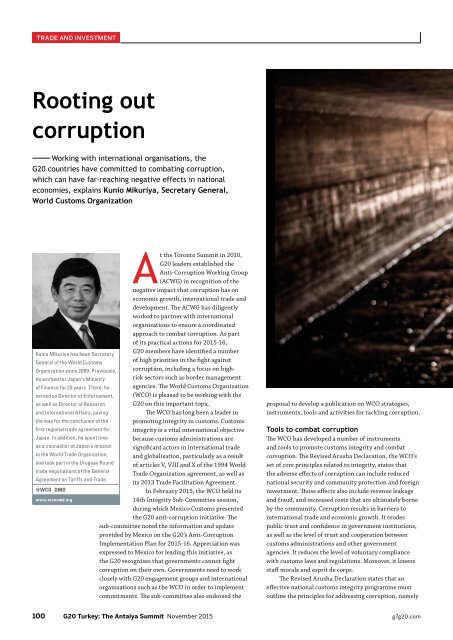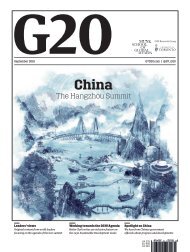G20-2015 Turkey
Create successful ePaper yourself
Turn your PDF publications into a flip-book with our unique Google optimized e-Paper software.
TRADE AND INVESTMENT<br />
Rooting out<br />
corruption<br />
Working with international organisations, the<br />
<strong>G20</strong> countries have committed to combating corruption,<br />
which can have far-reaching negative effects in national<br />
economies, explains Kunio Mikuriya, Secretary General,<br />
World Customs Organization<br />
At the Toronto Summit in 2010,<br />
<strong>G20</strong> leaders established the<br />
Anti-Corruption Working Group<br />
(ACWG) in recognition of the<br />
negative impact that corruption has on<br />
economic growth, international trade and<br />
development. The ACWG has diligently<br />
worked to partner with international<br />
organisations to ensure a coordinated<br />
approach to combat corruption. As part<br />
of its practical actions for <strong>2015</strong>-16,<br />
<strong>G20</strong> members have identified a number<br />
Kunio Mikuriya has been Secretary<br />
General of the World Customs<br />
of high priorities in the fight against<br />
Organization since 2009. Previously, corruption, including a focus on highrisk<br />
sectors such as border management<br />
he worked for Japan’s Ministry<br />
of Finance for 25 years. There, he agencies. The World Customs Organization<br />
served as Director of Enforcement, (WCO) is pleased to be working with the<br />
as well as Director of Research <strong>G20</strong> on this important topic.<br />
and International Affairs, paving<br />
The WCO has long been a leader in<br />
the way for the conclusion of the promoting integrity in customs. Customs<br />
first regional trade agreement for integrity is a vital international objective<br />
Japan. In addition, he spent time because customs administrations are<br />
as a counsellor at Japan’s mission significant actors in international trade<br />
to the World Trade Organization, and globalisation, particularly as a result<br />
and took part in the Uruguay Round of articles V, VIII and X of the 1994 World<br />
trade negotiations of the General<br />
Trade Organization agreement, as well as<br />
Agreement on Tariffs and Trade.<br />
its 2013 Trade Facilitation Agreement.<br />
@WCO_OMD<br />
In February <strong>2015</strong>, the WCO held its<br />
www.wcoomd.org<br />
14th Integrity Sub-Committee session,<br />
during which Mexico Customs presented<br />
the <strong>G20</strong> anti-corruption initiative. The<br />
sub-committee noted the information and update<br />
provided by Mexico on the <strong>G20</strong>’s Anti-Corruption<br />
Implementation Plan for <strong>2015</strong>-16. Appreciation was<br />
expressed to Mexico for leading this initiative, as<br />
the <strong>G20</strong> recognises that governments cannot fight<br />
corruption on their own. Governments need to work<br />
closely with <strong>G20</strong> engagement groups and international<br />
organisations such as the WCO in order to implement<br />
commitments. The sub-committee also endorsed the<br />
proposal to develop a publication on WCO strategies,<br />
instruments, tools and activities for tackling corruption.<br />
Tools to combat corruption<br />
The WCO has developed a number of instruments<br />
and tools to promote customs integrity and combat<br />
corruption. The Revised Arusha Declaration, the WCO’s<br />
set of core principles related to integrity, states that<br />
the adverse effects of corruption can include reduced<br />
national security and community protection and foreign<br />
investment. Those effects also include revenue leakage<br />
and fraud, and increased costs that are ultimately borne<br />
by the community. Corruption results in barriers to<br />
international trade and economic growth. It erodes<br />
public trust and confidence in government institutions,<br />
as well as the level of trust and cooperation between<br />
customs administrations and other government<br />
agencies. It reduces the level of voluntary compliance<br />
with customs laws and regulations. Moreover, it lowers<br />
staff morale and esprit de corps.<br />
The Revised Arusha Declaration states that an<br />
effective national customs integrity programme must<br />
outline the principles for addressing corruption, namely<br />
100 <strong>G20</strong> <strong>Turkey</strong>: The Antalya Summit November <strong>2015</strong> g7g20.com
















